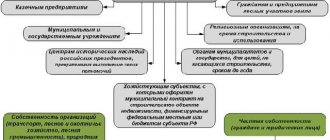- Grounds for termination of ownership of a land plot
- Grounds for termination of the right of permanent (indefinite) use of a land plot, the right of lifelong inheritable ownership of a land plot
- Grounds for termination of land lease
- Grounds for termination of gratuitous fixed-term use of land
- Grounds for termination of easement
- Confiscation, including through redemption, of land plots for state or municipal needs
Grounds for termination of ownership of a land plot
The right of ownership of a land plot is terminated when the owner alienates his land plot to other persons, the owner renounces the right of ownership of the land plot, and due to forced seizure from the owner of his land plot in the manner established by civil legislation (Article 44 of the Land Code of the Russian Federation). This list of reasons should be considered exhaustive.
Alienation by the owner of his land plot to other entities is possible on the basis of an agreement. Citizens and legal entities are free to enter into contracts. Its conditions are determined at the discretion of the parties, except in cases where the content of the relevant condition is prescribed by law or other legal acts (Article 421 of the Civil Code of the Russian Federation). The agreement must comply with the rules obligatory for the parties, established by laws and other legal acts (imperative norms) in force at the time of its conclusion (Article 422 of the Civil Code of the Russian Federation). There are separate imperative norms, for example, in the Land Code of the Russian Federation (Articles 27, 52) and other federal laws.
The owner has the right to unilaterally abandon the land plot belonging to him. In this case, he submits an application for refusal to exercise ownership of the land plot to the local self-government body in charge of the relevant lands. From the moment the application is submitted, the land plot acquires the legal status of an ownerless immovable property. The procedure for terminating rights to it is established by civil law. Ownerless real estate is accepted for registration by the body that carries out state registration of rights to real estate, upon application from the local government body in whose territory they are located. After a year has passed from the date of registration of an ownerless immovable property, the body authorized to manage municipal property may apply to the court with a demand to recognize the right of municipal ownership of the ownerless land plot. If this land plot is not recognized by a court decision as having come into municipal ownership, it may be again taken into possession, use and disposal by the owner who left it, or acquired into ownership by virtue of acquisitive prescription (Article 226 of the Civil Code of the Russian Federation).
The grounds for forced seizure from the owner of a land plot may be the guilty actions of the owner of the land plot or other circumstances.
The guilt of the owner of the land plot is proven when the land plot is confiscated in connection with its use by the owner not in accordance with its purpose (Article 284 of the Civil Code of the Russian Federation) or with a gross violation of the rules for the rational use of land, including misuse of the land plot (Article 285 of the Civil Code RF), upon confiscation of a land plot by a court decision in the form of a sanction for committing a crime (Article 50 of the Land Code of the Russian Federation).
Other circumstances for the seizure of a land plot from the owner may be its purchase for state or municipal needs or requisition in the manner established by federal law.
State reimbursement
Extending the topic of state compensation for the value of territory when it is withdrawn for public needs, it is worth noting that this is not an arbitrary order and it is based not only on domestic legal acts, but also complies with the requirements of international treaties.
Since the legislation is aimed at protecting the population, as well as the rights and freedoms of each citizen in particular, the compensation paid for terminated rights to seized land should be equivalent not only to the cost of this object. It also takes into account other financial losses of a person, such as loss of profit, time to search for other similar real estate and other individual circumstances.
Guarantees of the interest and rights of each owner of land subject to state purchase are reflected in Article 279 of the Civil Code. At the same time, the person leasing the land does not receive any compensation, except for compensation for losses incurred by him upon termination of his activity.
Despite the fact that foreclosure is a forced form of termination of proprietary rights, it is still a fundamentally different option from the termination of gratuitous rights arising through the fault of the owner.
Grounds for termination of land lease
The lease of a land plot is terminated on the grounds and in the manner provided for by civil law. It establishes the possibility of early termination of the contract at the request of the lessor (Article 619 of the Civil Code of the Russian Federation) and early termination of the contract at the request of the tenant (Article 620 of the Civil Code of the Russian Federation). In addition to the grounds specified in the Civil Code of the Russian Federation, the lease agreement may establish other grounds for its early termination at the request of the lessor or lessee.
At the same time, the Land Code of the Russian Federation provides for a number of grounds on which the lease of a land plot can be terminated at the initiative of the lessor. They recognize:
- use of a land plot not in accordance with its intended purpose and belonging to one or another category of land provided for by land legislation;
- use of land that leads to a significant decrease in the fertility of agricultural land or a significant deterioration of environmental damage. This basis does not apply during the period of agricultural work and in other cases established by federal laws;
- failure to eliminate the consequences of a deliberately committed land offense, expressed in poisoning, pollution, damage or destruction of the fertile layer of soil due to violation of the rules for handling fertilizers, plant growth stimulants, pesticides and other dangerous chemical or biological substances during their storage, use and transportation, resulting in damage harm to human health and the environment;
- non-use of a land plot intended for agricultural production or housing or other construction for the specified purposes for three years, unless a longer period is established by federal law or a land lease agreement, with the exception of the time necessary for the development of the land plot, as well as the time during which the land plot could not be used for its intended purpose due to natural disasters or other circumstances precluding such use;
- seizure or requisition of a land plot for state or municipal needs in accordance with the rules established by the Land Code of the Russian Federation.
Historical background
Termination of property rights is not a new procedure for Russians and the current Land Code. Many similar actions were used even in pre-revolutionary times, when for state needs lands were taken away from the owners, instead of which they were given the opportunity to take fertile soil and other property to another place.
Moreover, in Soviet times there were even basic land legislation in force, which also regulated the procedure for the seizure of objects. At that time, the construction of a plant, factory, power station, as well as the expansion of populated areas was considered public needs. However, the consequences after the seizure of the site were different. So, for example, the seizure was not a ransom, despite the fact that the land was taken by the state through no fault of the owner. In other words, the person was compensated only for the loss he suffered due to the fact that the land was taken, but he did not receive anything in return for the territory itself.
The changes that the legal act underwent in the form in which it can be observed today were introduced in 1991, when the Russian Federation began to actively develop agrarian reform.
Grounds for termination of gratuitous fixed-term use of land
This right may be terminated upon expiration of the period for which the land plot was provided, or by decision of the person who provided the land plot, or by agreement of the parties.
When a land plot has been provided as a service allotment, the right to it is terminated due to the termination by the employee of the employment relationship in connection with which he was provided with the official allotment, with the exceptions specified in the law. Thus, the right to an official allotment is retained by an employee who has terminated his employment relationship upon transferring to an old-age pension or a disability pension. This right is also reserved for one of the family members when the employee is called up for active military or alternative service, - for the entire period of service, when the employee entered study, - for the entire period of study in an educational institution, when the employee died in connection with the execution of official duties.
The right to an official allotment is reserved for a disabled spouse and elderly parents of an employee for life, and children of employees until they reach adulthood.
Termination of the right to an official allotment is formalized by a decision of the organization that provided such official allotment for use. An employee who has terminated his employment relationship with the organization that provided the service plot for use has the right to use this service plot after the termination of the employment relationship for the period necessary to complete agricultural work.
Development of a legal institution
After the Land Code of the Russian Federation came into force, a new stage began in the development of legal institutions, in particular those related to the termination of property rights and seizure of real estate. A special regulatory act was created, which displays a list of compelling reasons giving the state and municipal authorities the power to seize private property (Article 49 of the Land Code).
Grounds for seizure of plots:
- International obligations;
- The need to locate an object of municipal or state significance, if no other options for their location are available;
- Location of the federal or regional energy system;
- Construction of a facility using nuclear energy;
- Location of a defensive facility, military unit;
- Paving the way for federal transport, communication and information routes;
- Construction of a facility to support space activities;
- Laying a linear facility of regional or federal purpose for monopoly activities;
- Laying communication systems at the municipal level;
- Laying a highway of any national importance.
Grounds for termination of easement
Current legislation distinguishes between private and public easements. A private easement is terminated on the grounds provided for by civil law.
The easement is preserved in the event of transfer of rights to the land plot, which is encumbered by this easement, to another person. It cannot be an independent subject of sale or purchase, or pledge, and cannot be transferred in any way to persons who are not the owners of the real estate to ensure the use of which the easement has been established.
At the request of the owner of a land plot encumbered by an easement, it may be terminated due to the disappearance of the grounds on which the easement was established. In cases where a land plot owned by a citizen or legal entity, as a result of being encumbered with an easement, cannot be used in accordance with the purpose of the site, the owner has the right to demand in court the termination of the easement (Article 276 of the Civil Code of the Russian Federation).
A public easement may be terminated in the absence of the public needs for which it was established by adopting an act of cancellation of the easement. This easement may also terminate if the land plot is seized by state authorities or local self-government (clause 7 of Article 23 of the Land Code of the Russian Federation).
Arbitrage practice
Having analyzed the judicial practice, we can conclude that there are often claims when the applicant wants to cancel the contract of sale of a house located on a plot of lifelong ownership, justifying his claims by the impossibility of disposing of the property in this way.
After all, according to the law, it is impossible to sell property that is in lifelong ownership. But the applicant is mistaken; the rule applies exclusively to the site. Structures erected on the territory are permitted to be sold. This is confirmed in practice.
In the city of Sochi, a citizen filed a lawsuit in the Khostinsky District Court with the aim of invalidating the purchase and sale agreement of a private house, which is located on his plot, transferred to him for lifelong use. The court, relying on the rules of law, refused.
Special cases
In Article 23 of the Land Code of the Russian Federation, the owner retains the right to demand compensation for losses incurred during the seizure of property, even if the property is encumbered with a public easement.
The main condition for such a requirement is the impossibility of exploitation of the territory due to an easement. Simultaneously with this case, the law on the protection of natural areas can also be highlighted. Article 26 of the Land Code states that the owner’s land can be confiscated if it is recognized as a protected object, natural monument or complex at the state level. Also, after such recognition, tenants may lose the right to use the land.
Of course, at the state level they can endlessly adopt all sorts of amendments and additions to the list of grounds for the seizure of territories, both with and without ransom. The current rules regarding the termination of property rights in favor of a municipality or state can be found in Article 55 of the Land Code of the Russian Federation.









